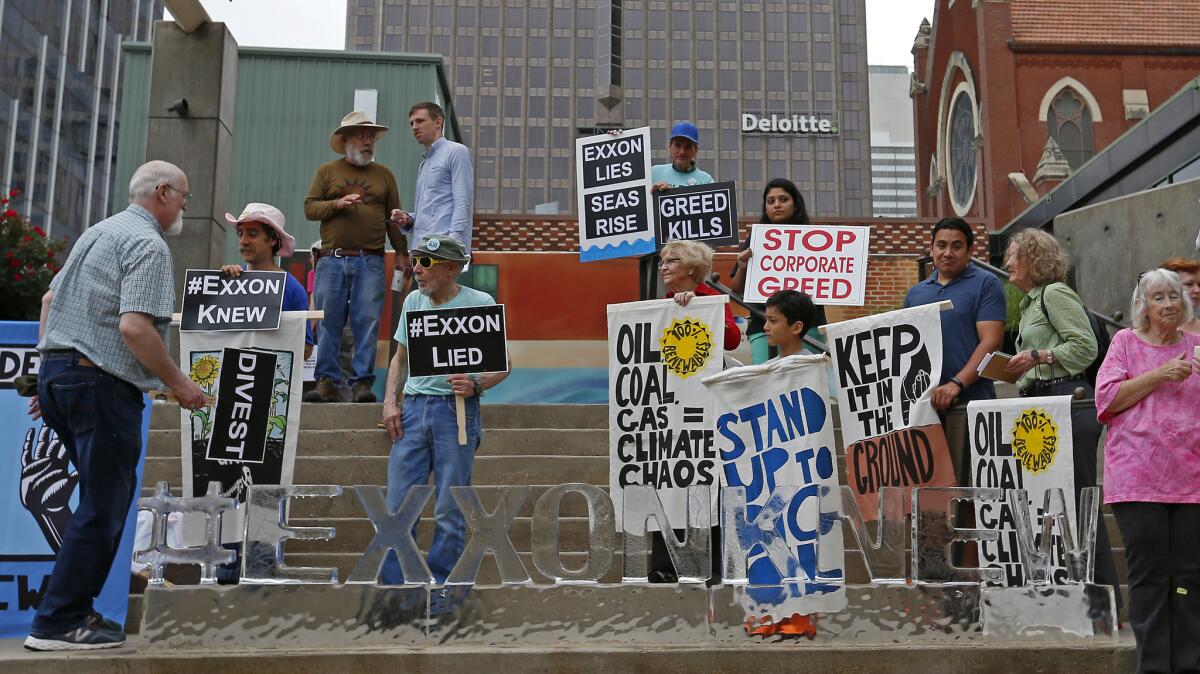Editorial: Climate change is the most pressing issue of our time. So why isn’t it getting more play in the election?

- Share via
With the exception of a handful of quacks and deniers, the vast majority of scientists believe that human activity – primarily the burning of fossil fuels – is driving up temperatures around the world, and that the pace of global warming is accelerating faster than earlier believed. Warmer temperatures unleash more extreme weather systems, exacerbate drought cycles, and melt the poles and glaciers, leading to rising sea levels that in the not-distant future will have disastrous effects, such as swamping swaths of Bangladesh, submerging the Marshall Islands and flooding low-lying coasts around the U.S., including Marina del Rey and other Southern California seaside communities.
The scientific evidence is clear: Change is already happening. Record-high temperatures in the Arctic in January and February were described by one scientist as “startling.” World temperatures in February set a record so far above the previous one that a researcher referred to it as a “shocking” increase. After that, March and April exceeded that record gap by even wider margins, making it nearly inevitable that 2016 will be the warmest year on record (just as 2014 and 2015 were).
Climate change is, as U.N. Secretary-General Ban Ki-moon recently put it, “one of the most crucial problems on Earth.” Yet the issue has been largely absent from the current presidential campaign. We’d like to say that is surprising, but unfortunately it is to be expected. Like many Republicans, Donald Trump denies climate change even exists, which should serve as further proof, if more is needed, that he is unqualified to run the country. Democrats Hillary Clinton and Bernie Sanders both believe the science and have issued detailed proposals for increasing solar and other renewable energy sources while throttling back our reliance on fossil fuels. And they both recognize the absolute necessity for the U.S. to lead the world in efforts to limit the looming damage as much as is possible. But they too realize that climate change is not good campaign material: It’s depressing, it’s complicated, it’s hard for voters to comprehend, its solutions are scary because they require lifestyles changes and personal sacrifice.
So what forms the core of our political discourse instead? It’s ranged from the size of Trump’s, uh, hands to whether Clinton enabled her husband’s philandering to how to make Mexico pay for a wall the length of the border, along with international trade agreements, under what circumstances the military should be deployed, and whether the multi-nation deal with Iran to freeze its nuclear program was wise or foolish.
Given the severity of the threat, the issue should play a far greater role in the national discussion.
Climate change barely resonates. An assessment in March by Media Matters found that across 20 debates among candidates in both major parties, global warming accounted for only 1.5% of the questions asked – 22 out of 1,477 questions. Nearly a third of the questions came in two Florida debates after some of that states’ mayors asked that the issue be addressed. And voters haven’t particularly cared, either. A February Gallup poll found climate change low on the list of issues that voters say matter to them – especially for Republicans, for whom it was the least-significant issue included in the survey.
That’s a lot of heads in the sand – dangerously so if the sand happens to be near the rising seas.
The globe is teetering on the edge of catastrophic change. Nearly 200 nations agreed in Paris six months ago to work together to stop global temperatures from rising more than 2 degrees Celsius above preindustrial levels. It was a good start, but some experts doubt it will be enough for the world to avoid the worst ravages of climate change.
Still, that’s no excuse for inaction. The world needs to continue – and hasten – the shift in how it creates and uses energy; it must invest in technological innovation and craft programs to mitigate the effects of the changes we’ll be unable to stop. In Louisiana, the federal government already is spending $48 million to move a village of about 100 Biloxi-Chitimacha-Choctaw Indians whose land is being consumed by the Gulf of Mexico. Another project using mostly state money is relocating the remote native village of Newtok, Alaska. A 2009 Army Corps of Engineers report questioned the viability of at least two dozen more Alaskan villages similarly threatened by the shrinking ice cap and thawing permafrost, which increase flooding and shoreline erosion.
Confronting the challenges of climate change will require significant political leadership, particularly since a cluster of deniers hold influential congressional positions. Given the severity of the threat, the issue should play a far greater role in the national discussion.
Yes, Islamic State is a destabilizing force, income inequality may have knocked the nation’s middle class on its heels and there’s way too much money skewing our political system. But climate change, with its mass variations in weather patterns, disappearing coastlines, longer and drier droughts and ensuing conflicts over access to water and habitable terrain, is a looming problem that threatens to upend world politics. Unless we stop looking at it as a back-burner issue, we’re going to pay the consequences much sooner than we think.
Follow the Opinion section on Twitter @latimesopinion and Facebook
More to Read
A cure for the common opinion
Get thought-provoking perspectives with our weekly newsletter.
You may occasionally receive promotional content from the Los Angeles Times.










